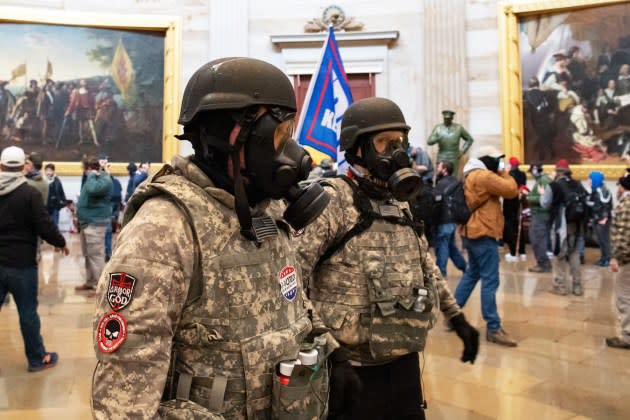Punishing Military Extremists Would Be Too Divisive: Pentagon Report

Using “punitive” measures to stamp out extremism in the ranks of the United States military would “risk alienating a significant part of the force.”
That’s the startling conclusion of a long-awaited report on prohibited extremist activities in the Department of Defense, commissioned in the wake of the violent insurrection at the U.S. Capitol on Jan. 6, 2021. The assault involved dozens of individuals connected to the military, including veterans in the Oath Keepers militia who were later convicted of seditious conspiracy.
The Pentagon report insists that a perception of extremism in the ranks is “inconsistent with the military’s tradition of nonpartisanship” and risks undermining the forces’ “widespread public support.” It also underscores that violent action by “even a small number of individuals with military connections and military training … could present a risk to the military and to the country as a whole.”
Launched with a mandate to illuminate the “scope of the problem,” the new 262-page report presents surprisingly little new data. It offers, instead, sweeping generalities — some of which appear intended to downplay the problem. That includes the cold-comfort assertion that there is “no evidence that the number of violent extremists in the military is disproportionate to the number of violent extremists in the United States as a whole.”
In fact, the Pentagon has appeared eager to downplay this “independent study on extremist behavior” altogether. The research was completed in June 2022, but the DOD did not release the final report until the last week of 2023, as part of a pre-New Year’s news dump.
Despite recognizing the risks of violent extremists in the services, the Pentagon report ultimately concludes that addressing hateful ideologies head-on could pose another, perhaps greater, threat — undermining the U.S. military as a rare bastion of national unity in an increasingly fractious political age.
Suggesting that the military’s definitions of extremism are somehow imprecise, the report argues that a crackdown could leave “some members of the military believing that they are being targeted for their views.” The report relays the concern that some in the military view the Pentagon’s “current focus on extremism” as being “driven by ‘political correctness’ and an unbalanced approach that targets only one side of the political spectrum.”
Describing “inherent gray areas in any definition of extremism,” the report asserts that “a punitive approach to all forms of prohibited extremist activities would risk alienating a significant part of the force.” In short, the document states: “The risk to the military from widespread polarization and division in the ranks may be a greater risk than the radicalization of a few service members.”
Ironically, this report lionizing the apolitical cohesion of the services has become public at a moment when right-wing elected officials are increasingly attacking the military as being “woke.” Former President Donald Trump has called for the execution of former Joint Chiefs of Staff Chairman Gen. Mark Milley, whom he’s blasted as a “woke train wreck.” Sen. Tommy Tuberville (R-Ala.) brought confirmations of top military brass grinding to a halt last year in a fruitless crusade against abortion care in the military, as well as to block “woke” appointees. At a Republican-led congressional hearing last month on “Recruiting Shortfalls and Growing Mistrust: Perceptions of the U.S. Military,” Rep. Jim Banks (R-Ind.) demanded the military deliver “a consistent message that emphasizes service and commitment — and doesn’t cater to woke theories.”
Apparently to guard against such perceptions of liberal bias, the Pentagon has jettisoned a conservative, law-and-order approach to punishing wrongdoers in its ranks — with the report calling instead for “carefully modulated” tactics to counter extremism.
The new Pentagon report recommends against classifying “prohibited extremist activities” as new criminal offenses under the Uniform Code of Military Justice — proposing instead that “extremist motivations” be considered an “aggravating factor” when sentencing for existing crimes.
For lesser transgressions, the report recommends “restorative interventions,” including “counseling before punishment.” The report quotes one senior military official as saying: “Sometimes, people just come in from a bigoted or intolerant home situation and don’t know any better. That can usually be addressed with mentoring.”
In a revealing recommendation, the report also calls on the Pentagon to “clarify the line between individual racist/harassment/bullying offenses and cases of prohibited extremist behavior.”
In an odd twist, the Pentagon report cloaks such touchy-feely recommendations as a callback to tradition — suggesting that the military can simply military its way out of any extremist issues. “Military core values help build greater connectedness,” the report asserts, “and may serve as a bulwark to … sustain resistance to radicalization.”
More from Rolling Stone
Revealed: Roger Stone's Secret Call With Proud Boys Leader in Lead-Up to Jan. 6
Inside the Trump Plot to Turn His Jan. 6 Trial Into a 'MAGA Freak Show'
'Dictator' Trump Plans to Deploy Massive Number of Troops on U.S. Soil
Best of Rolling Stone

